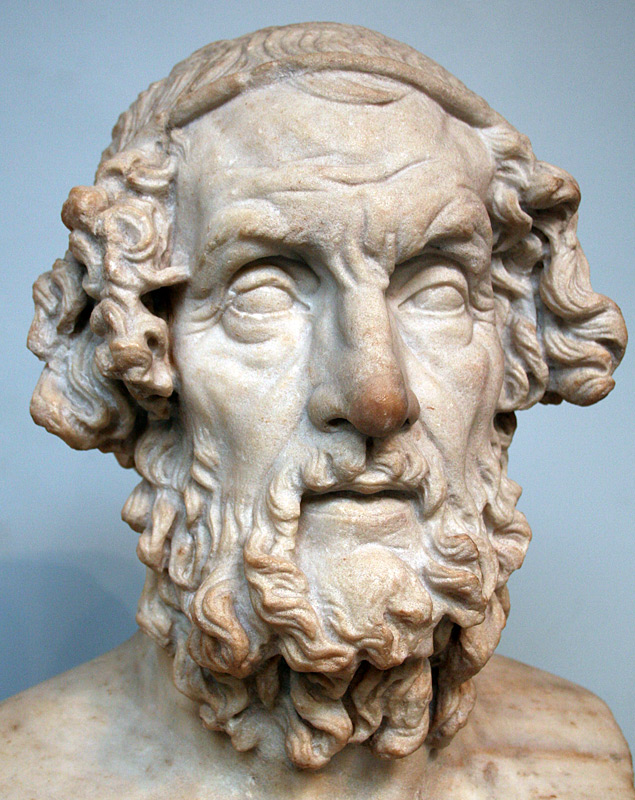Homér Quotes
“Wine can of their wits the wise beguile, Make the sage frolic, and the serious smile”
XIV. 463–466 (tr. Alexander Pope).
Odyssey (c. 725 BC)
Context: Tis sweet to play the fool in time and place,
And wine can of their wits the wise beguile,
Make the sage frolic, and the serious smile,
The grave in merry measures frisk about,
And many a long-repented word bring out.
VI. 146–149 (tr. R. Lattimore); Glaucus to Diomed.
Alexander Pope's translation:
: Like leaves on trees the race of man is found,
Now green in youth, now withering on the ground:
Another race the following spring supplies,
They fall successive, and successive rise:
So generations in their course decay;
So flourish these, when those are past away.
Iliad (c. 750 BC)
Source: The Iliad
VII. 99–100 (tr. Samuel Butler).
Iliad (c. 750 BC)
“He lacks the sense to see a day behind, a day ahead.”
I. 343 (tr. Robert Fagles).
Iliad (c. 750 BC)
IV. 164–165 (tr. Robert Fagles); spoken by Agamemnon.
Iliad (c. 750 BC)
XIX. 592–594 (tr. Robert Fagles).
Odyssey (c. 725 BC)
XXIV. 522–526 (tr. Robert Fagles).
Iliad (c. 750 BC)
“As when in harp and song adept, a bard
Unlab'ring strains the chord to a new lyre.”
XXI. 406–407 (tr. William Cowper).
Odyssey (c. 725 BC)
IX. 498–500 (tr. Alexander Pope).
Iliad (c. 750 BC)
“Oh but if Zeus's lightning blinded us those days,
it's Zeus who drives us, hurls us on today!”
XV. 724–725 (tr. Robert Fagles).
Iliad (c. 750 BC)
“Bear up, old heart! You've borne worse, far worse…”
XX. 18 (tr. Robert Fagles).
: Bear up, my soul, a little longer yet;
A little longer to thy purpose cling!
Source: Odyssey (c. 725 BC), P. S. Worsley's translation:
“They remembered bed and took the gift of sleep.”
XVI. 481 (tr. Robert Fagles).
Odyssey (c. 725 BC)
XI. 514–515 (tr. Samuel Butler).
Iliad (c. 750 BC)
“If any man obeys the gods, they listen to him also.”
I. 218 (tr. Richmond Lattimore).
Iliad (c. 750 BC)
“Ashamed to decline the challenge, yet fearing to accept it.”
VII. 93 (tr. Samuel Butler).
Iliad (c. 750 BC)
XXIV. 485–486 (tr. Robert Fagles).
Odyssey (c. 725 BC)
“There can be no covenants between men and lions, wolves and lambs can never be of one mind.”
XXII. 262–263 (tr. Samuel Butler); Achilles to Hector.
Iliad (c. 750 BC)
XXI. 462–466 (tr. R. Lattimore); Apollo to Poseidon.
Iliad (c. 750 BC)
VIII. 551–555 (tr. Robert Fagles).
Alexander Pope's translation:
: As when the moon, refulgent lamp of night,
O'er heaven's clear azure spreads her sacred light,
When not a breath disturbs the deep serene,
And not a cloud o'ercasts the solemn scene;
Around her throne the vivid planets roll,
And stars unnumbered gild the glowing pole,
O'er the dark trees a yellower verdure shed,
And tip with silver every mountain's head;
Then shine the vales, the rocks in prospect rise,
A flood of glory bursts from all the skies.
Iliad (c. 750 BC)
XIII, 130–131 (tr. R. Lattimore).
Iliad (c. 750 BC)
“And you, old sir, we are told you prospered once.”
XXIV. 543 (tr. R. Lattimore); Achilles to Priam.
Iliad (c. 750 BC)
IX. 408–409 (tr. Robert Fagles).
Iliad (c. 750 BC)
VIII. 329–331 (tr. Alexander Pope).
Odyssey (c. 725 BC)
“Well then, what shall I go through first,
what shall I save for last?”
IX. 14 (tr. Robert Fagles)
Odyssey (c. 725 BC)
XIII. 358–360 (tr. Robert Fagles).
Iliad (c. 750 BC)
VII. 216–218 (tr. P. S. Worsley).
Odyssey (c. 725 BC)
“For a guest remembers all his days the hospitable man who showed him kindness.”
XV. 54–55 (tr. G. H. Palmer).
Odyssey (c. 725 BC)
XVI. 671–673 (tr. R. Lattimore). Cf. Virgil, Aeneid, VI.278.
Iliad (c. 750 BC)
“No more entreating of me, you dog, by knees or parents.”
XXII. 345 (tr. R. Lattimore); Achilles to Hector.
Iliad (c. 750 BC)
“Not iron, trust me,
the heart within my breast. I am all compassion.”
V. 190–191 (tr. Robert Fagles).
Odyssey (c. 725 BC)
